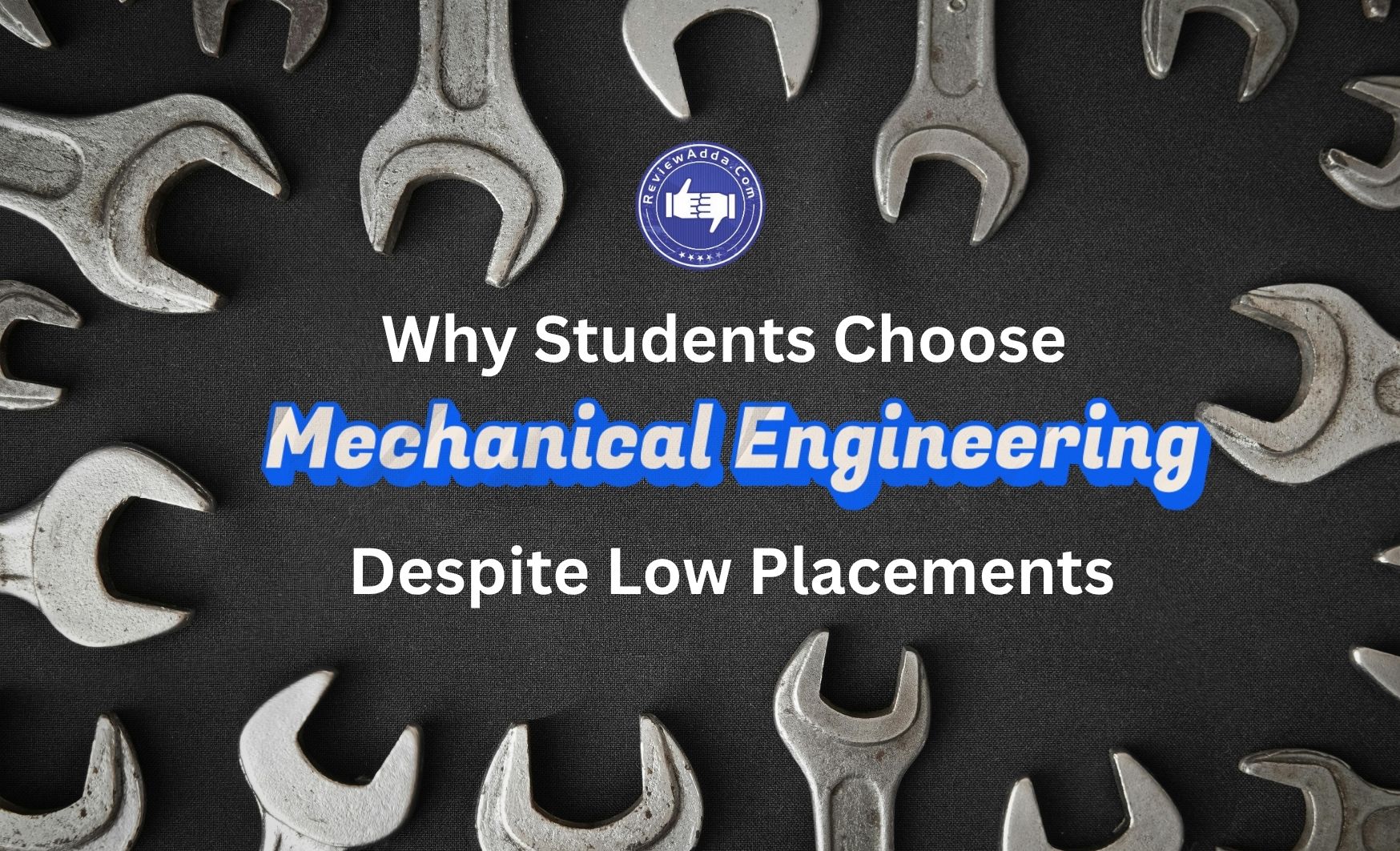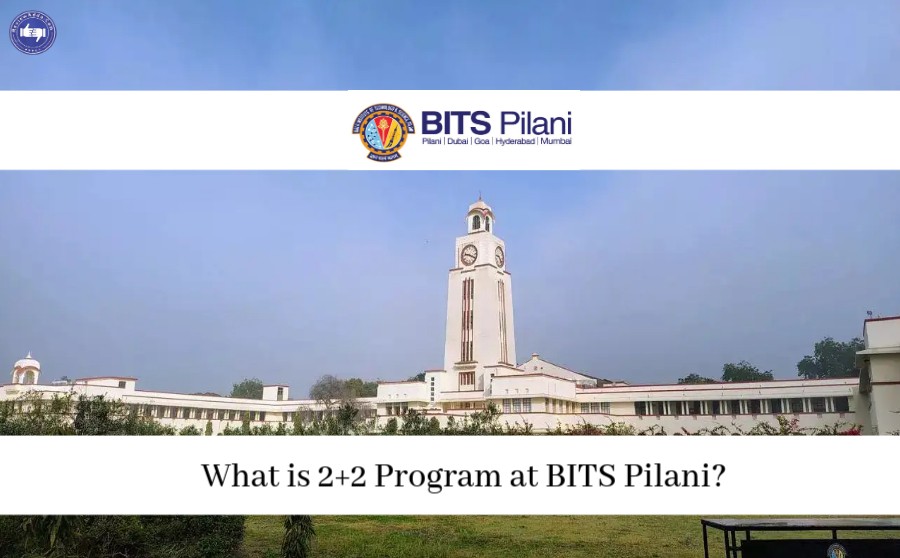Introduction
Every year, thousands of students in India chart their career paths by choosing an engineering branch—and among these, Mechanical Engineering continues to remain a popular choice. Yet paradoxically, many of these students are aware that placement statistics for mechanical engineering graduates often lag behind those of disciplines like computer science or IT. So why do students still opt for mechanical engineering? What is driving this decision, and how should students evaluate whether it’s the right path for them?
In this article, we explore in depth why students choose mechanical engineering despite lower placement prospects, discuss the underlying motivations, analyse the trade-offs, and provide guidance on how to make the branch work for one’s future. This is particularly relevant for students, parents, and counselling services (such as your platform, ReviewAdda) that wish to make informed, strategic decisions beyond raw placement numbers.
The Context: Mechanical Engineering in India
Before delving into motivations, let’s look at the macro-context of mechanical engineering in India: its scope, challenges, and how placement statistics compare.
Scope & Versatility
Mechanical engineering is often described as the “mother” or “broadest” of engineering disciplines. It deals with design, manufacturing, analysis, maintenance and operation of machines and systems. According to an article by GKU University, the discipline covers thermodynamics, fluid mechanics, materials, robotics and many more domains. Other sources highlight that mechanical engineers have opportunities across automotive, aerospace, energy, manufacturing, automation and infrastructure sectors.
Strong Fundamental Skills
Mechanical engineering typically demands strong fundamentals in mathematics, physics and engineering. This gives students a broad engineering base. For example, blogs emphasise that mechanical engineering fosters problem-solving, hands-on experience and transferable skills.
Placement Realities & Challenges
Despite these strengths, mechanical engineering as a branch has faced placement headwinds in many colleges; the reasons are multifield (we’ll explore later). Recent news trends show that while mechanical seats are now witnessing some revival, the competition and market dynamics remain tougher for core branches compared to IT/CS.
The bottom line is: students choosing mechanical engineering often know they are taking a less “safe” branch in terms of immediate high-package campus placements—but there are other compelling reasons.
Why Students Choose Mechanical Engineering: Key Motivations
Here are the most common reasons why students still opt for mechanical engineering, despite known placement risks. Each motivation merits understanding so that one can either align deliberately or choose another path.
1. Personal Interest & Aptitude for Machines, Physics & Design
Many students are drawn to how things work: machines, engines, mechanisms, manufacturing processes. For a student who loves solving physical-mechanical problems—“why does this engine heat up”, “how can I design a better gear box”, “how does robotics apply to manufacturing”—mechanical engineering speaks directly to their interest.
Blogs on the topic emphasise that mechanical engineering is more “hands-on” and “practical” than many abstract branches.
For such students, a branch they enjoy can outweigh a safer but less intellectually satisfying branch. They see value in engaging with hardware, design, real-world systems.
2. Broad Base & Versatility of the Discipline
Mechanical engineering offers a broad base—many sub-specialisations, many industry sectors. Unlike very niche specialisations, mechanical engineering gives the flexibility to pivot into design, manufacturing, automation, energy, even service engineering.
As one blog puts it: “Mechanical engineering is a broad field … connected with every aspect of our daily lives.”
This versatility appeals to students who aren’t sure exactly which niche they will specialise in, but want a strong engineering base.
3. Long-Term Career Perspective, Not Just Immediate Placements
Some students and parents are taking a longer-term view: they may accept that early placements might not be as flashy—but believe the mechanical engineering branch will yield reliable career growth, or allow them to move into higher levels (design, R&D, entrepreneurship) over time.
Because mechanical engineering deals with systems, machines and industrial processes, the belief is that over time the branch will remain relevant even if it is not always in the limelight for high-package entry roles.
4. Family/Legacy Business, Location & Practical Considerations
For many families, practical considerations dominate:
- A student may be from a family business in manufacturing, automotive, brakes, machine tools (as in the case of your co-founder’s peer, for example) and so mechanical engineering aligns directly with the business.
- Students from non-metropolitan locations may opt for mechanical engineering because local industries (manufacturing, automotive, infrastructure) still hire mechanical engineers more directly.
- Location constraints (wanting to stay close to home) may favour mechanical over branches like IT which might need relocation to bigger hubs.
5. Entrepreneurship & Innovation Opportunity
Mechanical engineering allows students to work on real world physical products, systems and machines—something that appeals to entrepreneurial minds. Whether designing a new mechanical device, automating manufacturing, working on robotics or working on sustainable energy systems, mechanical engineering offers tangible building blocks.
Several blogs emphasise that students in mechanical engineering can become entrepreneurs, build startups around products, or work in R&D and innovation.
6. Passion for Core Engineering and Systems Thinking
Some students are drawn to the “core engineering” identity — they want to be in the realm of manufacturing, design, mechanical systems, physical infrastructure rather than just software. For them, mechanical engineering is more satisfying because it deals with physical tangible systems, not just code.
They may feel more aligned with mechanical thinking, understanding of physics, thermodynamics, materials, rather than abstract algorithmic systems.
7. The Opportunity to Differentiate & Avoid Saturation
Given the rush into branches like computer science, AI, data science, mechanical engineering can sometimes be less crowded, may allow students to stand out, build a niche, or avoid the competition in oversubscribed IT/CS streams. Some news articles indicate that mechanical/civil engineering seats are witnessing renewed interest.
For students who believe they can leverage that to get good projects/roles in manufacturing/industrial domains, mechanical engineering becomes a deliberate strategic choice.
8. Aligning With National/Global Themes: Manufacturing, Industry 4.0, Infrastructure
From a macro-perspective, India is emphasising manufacturing, infrastructure, energy transition, sustainable technologies, robotics and automation. Mechanical engineering is at the heart of these themes. Blogs note that mechanical engineers will be required in renewable energy, robotics, nano?materials, manufacturing transformation.
Thus students who look ahead see the potential of mechanical engineering to be relevant in future, even if today’s placement numbers don’t reflect it fully.
Understanding the Trade-Offs: Why Placements are Relatively Low and How to Manage That
If students are choosing mechanical engineering despite known placement disadvantages, it is essential to understand why placements may be lower compared to other branches—and how one can mitigate the downsides.
Why Are Placements Lower for Mechanical Engineering?
-
Industry Demand & Supply Imbalance
While the mechanical engineering field remains broad, the pace of hiring, especially for entry-level roles, may be slower compared to IT/CS where digital transformation drives continuous hiring. Also, many mechanical roles are in manufacturing, maintenance, plant operations, which may offer slower growth or lower starting salaries relative to tech.
Some reports show mechanical seats reduced or less filled in recent years indicating demand crunch. -
Shift in Student Preferences
Many top students and parents now look for software/IT roles because of perceived high packages and rapid growth, creating a self-reinforcing cycle: fewer students in mechanical -> fewer placements -> less attractiveness.
For example, a report from Gujarat noted that branches like mechanical had far fewer admissions. -
Mismatch in Curriculum & Industry Ready Skills
In some colleges, mechanical engineering curricula may not be as updated or heavily invested in labs, industry partnerships, automation, design tools, robotics etc. This leads to graduates who are not fully aligned to what industries require, reducing placement performance. -
Slow Entry-Level Wage Growth / Less Glamour
Manufacturing / plant / design roles may offer lower initial salary than software roles, and slower path to high compensation. For many students focused only on “highest package” in first job, mechanical may look less attractive. -
Geographic Limitations
Many mechanical engineering roles may be in industrial or manufacturing hubs which may be away from metro locations; relocation or willingness to join field roles may be lower among students preferring metro/urban software jobs. -
Automation and Changing Industry Dynamics
With automation, Industry 4.0, robotics, some traditional manufacturing roles may be evolving or shrinking, or requiring skills that mechanical graduates may not yet fully possess (like mechatronics, sensors, data analytics). Unless mechanical programmes adapt, placement may lag.
How Students Can Mitigate and Turn the Trade-Off into Advantage
If one is choosing mechanical engineering with full awareness of the challenges, here are strategies to make a strong outcome:
- Choose the Right College & Environment
- Ensure the institute has strong labs, industry ties, design/manufacturing facilities, modern automation/robotics labs.
- Prefer universities that emphasise hands-on learning, workshops, internships, industrial visits.
- Check placement track record specifically for mechanical branch (not only overall college ranking).
-
Develop Niche Skills & Emerging Specialisations
Rather than generic mechanical engineering, focus early on niches such as robotics, automation, mechatronics, CAD/CAM, thermal systems for renewable energy, manufacturing analytics. These are higher-growth and better paid.
Many blogs emphasize the importance of specialising and staying updated. -
Internships & Projects Early
Get internships in manufacturing/ design/ automation sectors. Build meaningful projects (e.g., robot design, automation system, energy system) that showcase capabilities beyond routine coursework. This becomes a differentiator during placement. -
Cross-Skill with Digital/Software
Mechanical engineers who add software/analytics/data capability (e.g., CAD, SolidWorks, MATLAB, Python for simulations, IoT for machines) become more attractive to modern industries. -
Consider Migration to Design / R&D or Higher Studies
If your end goal is design, R&D or specialised roles, then mechanical engineering provides a strong base. Preparing for higher studies (M.Tech, MS) or design roles (vehicle design, manufacturing optimisation, robotics) can improve career trajectory. -
Leverage Manufacturing / Infrastructure Growth in India
With India’s push on manufacturing, renewable energy, infrastructure and “Make in India”, mechanical engineering can benefit. Students should align themselves with sectors which are growing (e.g., EV manufacturing, wind/solar energy systems, automation in factories).
The blog from GKU highlights this. -
Mindset: Long-Term View over Only First Salary
Don’t judge the branch purely by first job package. Many mechanical engineers build strong careers over time—in design, leadership, entrepreneurship, core industries—with competitive salaries in mid-career. Students who understand this tend to benefit more. -
Entrepreneurship/Start-ups
Mechanical engineers with product mindset can build start-ups (hardware, manufacturing, automation solutions). If students are inclined towards entrepreneurship, mechanical engineering can actually be a better fit than a purely software-oriented branch.
Myths & Realities: Mechanical Engineering vs Other Branches
In the counselling space, there are several myths or assumptions that need to be debunked or put into context—especially for high-performing students and parents.
Myth 1: “Mechanical engineering has no future compared to CS/IT.”
Reality: Mechanical engineering remains highly relevant globally and in India’s industrial agenda. Sectors like renewable energy, EVs, manufacturing automation, aerospace, robotics rely heavily on mechanical engineers. Blogs emphasise that mechanical engineering is evergreen.
Even though first-job placement packages may lag, the long-term scope and versatility are strong.
Myth 2: “Placements are bad across the board for mechanical engineering.”
Reality: While the average may be lower compared to some branches, outcomes vary widely by institute, specialisation, student effort and profile. Some colleges with strong mechanical programmes show excellent placement records. The student’s proactive strategy matters more than the branch label.
Also news reports show that mechanical engineering placements are resurging in some institutes.
Myth 3: “Only software roles are lucrative; hardware/core engineering is obsolete.”
Reality: Many industries still require core engineers; the hardware/physical side of engineering will remain critical. Digitalisation is enabling new roles for mechanical engineers (e.g., smart manufacturing, IoT in industry, robotics). The key is the engineer adapts.
Myth 4: “Choosing mechanical means you’ll be stuck in low level manufacturing forever.”
Reality: Mechanical engineering offers many career trajectories—design engineer, R&D, manufacturing optimisation, maintenance, project management, automation, entrepreneurship. If the student develops the right skill-set and mindset, progression is possible. Blogs list many career options for mechanical engineering.
How to Decide: Is Mechanical Engineering the Right Choice for You?
For a student (or parent) facing this decision—especially when the stronger immediate placement statistics may lie elsewhere—here is a decision framework tailored to your context (student is high-achiever, aiming premium outcome, your company offers premium counselling).
Step 1: Self-Assessment of Interest & Aptitude
- Do you enjoy physics, mechanics, machines, systems and designing physical objects?
- Do you prefer practical/hands-on learning over purely software abstractions?
-
Are you motivated by solving real-world physical/industrial problems rather than only writing code?
If yes, mechanical engineering may align well.
Step 2: Alignment with Career Goals
- Where do you see yourself in 5–10 years? In design, manufacturing, R&D, robotics, automation? Or strictly in software/AI/data roles?
- If you want early high-package software/IT jobs with minimal hardware exposure, then mechanical may require more strategy.
- If you are comfortable with a potentially slower start but stronger mid-career trajectory, mechanical is viable.
Step 3: Examine Institute & Programme Quality
- For your shortlist of institutes, check mechanical engineering branch placement history, lab facilities, specialisations, industry tie-ups.
- Evaluate if the institute emphasises modern domains like robotics, automation, IoT, electric vehicles in mechanical curriculum.
- Your counselling service (ReviewAdda) can provide branch-wise, institute-wise data rather than generic college rankings.
Step 4: Financial & ROI Considerations
- Mechanical engineering may cost similar to other branches in top colleges, but immediate placement packages may be lower—so evaluate ROI.
- Consider whether you are comfortable investing in this branch or whether you need a relatively quicker return.
- Discuss with parents: Are we choosing for passion + long-term returns, or for immediate high salary?
Step 5: Contingency Planning
- If you choose mechanical engineering, make an early plan for internships, niche skill-building, differentiators.
- Identify back-up pathways: can you pivot into design/automation/robotics or higher studies if placements don’t meet expectation?
- Understand that branch decisions are not final destiny—student effort and institute ecosystem matter.
Step 6: Use Your Network & Counselling Advantage
- Because you are part of the premium counselling space, encourage students to view mechanical engineering not as a fallback but as a deliberate strategic choice when aligned with interest and goals.
- Use data-driven counselling: show placement segmented by branch, institute and student profile. Embed mechanical engineering specialisations (like robotics, EV manufacturing) into counselling narratives.
Case Examples & Emerging Trends
Here are some illustrative trends and storylines to enrich counselling conversations.
- A recent news article indicates that in some institutes, mechanical engineering placements have out-performed computer science in a given year. This highlights that if the branch is supported by strong institute ecosystem, outcomes can surprise.
- Another article shows core engineering branches experiencing a revival in demand, indicating that mechanical engineering is getting renewed interest as industries rebuild.
- Students from manufacturing/automotive family businesses often pick mechanical engineering because it aligns with their real-world context and gives them global engineering leverage rather than just IT.
- The manufacturing and “Make in India” push, EV drives, automation mean that mechanical engineering graduates with digital/automation skills are increasingly in demand.
How Counsellors (and ReviewAdda) Should Frame Mechanical Engineering for Students & Parents
Since your platform deals with HNI parents and premium consulting, here’s how you should position mechanical engineering intelligently.
Positioning Messaging
- “Mechanical Engineering: the strategic, long-term engineering branch for students who want to build physical systems, design hardware, lead manufacturing, or become entrepreneurs in engineering products.”
- “Not merely a bridge to software—mechanical engineering gives you physical-world engineering capability plus option to pivot into automation/robotics/renewables.”
- “If you choose the right institute, build the right skills, mechanical engineering can lead to strong mid-career outcomes and global roles in designing machines, vehicles, systems.”
- “We help you evaluate mechanical engineering in the same rigorous way as any other branch: based on institute, programme specialisation, labs, industry tie-ups, student fit, cost vs long-term outcome—not just immediate package.”
Content & Marketing Use-Cases
- Publish articles/case-studies: “Why mechanical engineering is still a top choice: stories of alumni who studied mechanical engineering and are now doing EV design/robotics/manufacturing abroad.”
- Create downloadable resources: “Checklist for choosing mechanical engineering branch: labs, internship map, skill roadmap, 5 year-career map.”
- Host webinars: Invite mechanical engineering practitioners (design engineer in automotive, automation consultant in manufacturing) to speak about their career path, giving real insight beyond placement numbers.
- Branch-specific counselling sessions: For students considering mechanical engineering, hold focussed discussion on how to build their profile (internships, specialisations, project work) to maximize outcome.
Differentiating Service Value
Since your business aims at premium admissions consulting, you can differentiate by:
- Offering branch-wise outcome analytics (mechanical vs other branches) for each top institute.
- Offering skill-roadmaps and internship-connect networks for mechanical engineering students.
- Helping students from manufacturing/automotive family backgrounds align branch choice to business legacy, thereby turning mechanical engineering into a strategic asset rather than just an academic choice.
- Guiding students early to adopt automation, mechatronics and digital manufacturing skills (beyond standard mechanical curriculum) so that they become more employable than generic mechanical graduates.
Future Outlook: Why Mechanical Engineering may be Better Positioned than You Think
Looking ahead, mechanical engineering may gain increasing relevance—and for students who time their investment and skills well, the decision could pay off significantly.
Manufacturing & Infrastructure Growth in India
India is actively promoting manufacturing, automation, infrastructure, renewable energy—all domains where mechanical engineering is central. As such, mechanical engineers with modern skills may benefit from large national-level growth thrusts.
Convergence with Software & Digital Technologies
Mechanical engineering is no longer just about machines—it increasingly intersects with sensors, IoT, robotics, automation, smart manufacturing, additive manufacturing (3D printing). Students who embrace these convergent areas will be ahead of the curve.
Entrepreneurial & Product Innovation Opportunities
As product engineering becomes more accessible (due to cheaper prototyping, maker spaces, rapid manufacturing), mechanical engineers can build hardware start-ups, design new machines or tools, or work in industrial innovation—areas less crowded than software start-ups.
Global Mobility and Skill Transferability
Mechanical engineering skills are globally recognised. A mechanical engineer from India can find roles abroad in design/analysis/manufacturing, especially if they build cross-domain (automation/robotics) skills. Blogs highlight global salary potential for mechanical engineers in developed countries.
Thus choosing mechanical engineering today is not committing to low-end roles; it may be positioning for global mobility.
Actionable Checklist for Students Considering Mechanical Engineering
To wrap up, here’s a concise checklist for students and parents evaluating mechanical engineering branch:
- Do I have interest/aptitude in mechanics, machines, design, physical systems?
- Does the institute I’m considering have strong mechanical engineering labs, modern curriculum (automation, robotics, CAD/CAM, manufacturing analytics)?
- What is the placement track record of the mechanical engineering branch in the institute (not just overall college ranking)?
- What are the internship/project opportunities and industry tie-ups in mechanical/manufacturing/automation for the branch?
- What are the specialisations available: e.g., robotics/mechatronics, automotive, energy systems, manufacturing analytics?
- Am I willing to invest extra effort (skills beyond curriculum) to specialise and differentiate?
- What is the cost of the programme (fees + relocation/hostel) and what is realistic placement (first job) vs long-term outcome (5-10 years)?
- What is my fallback plan if placement doesn’t meet expectation—can I pivot to design/R&D/higher studies or change specialisation within mechanical?
- Are there local or family-business alignments (manufacturing, automotive, product design) that make mechanical engineering particularly relevant for me?
- How will I monitor and optimise my profile during the four years (internships, projects, clubs, innovation labs) so that I’m not a passive graduate but a proactive differentiator?
Conclusion
Choosing mechanical engineering despite the known placement challenges is a deliberate, value-driven decision rather than a default. Students are motivated by interest in machines and systems, versatility of the discipline, long-term career perspective, entrepreneurial aspirations, family/business alignment and emerging global trends.
For high-performing students (such as those you are guiding through ReviewAdda) the key lies in how you choose the mechanical engineering path—not merely that you choose it. Quality of institute, specialisation, proactive skill-building, project/internship work and alignment with future trends will determine outcome.
As a premium counselling service, you can position mechanical engineering not as a fallback but as a strategic branch for the right student: one who is clear about their interest, ready to build beyond the curriculum, and aiming for meaningful engineering outcomes (design, innovation, manufacturing transformation, global mobility) rather than just short-term high salary.
In the evolving engineering landscape of India, mechanical engineering may well be a smart choice for those willing to see beyond first placements and build enduring engineering careers.






